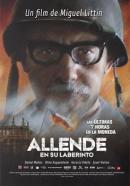- I paid my debt to Chile and Latin America.
The filmmaker Miguel Littín premiered in Ecuador his latest film Allende in his labyrinth, a historical drama of ninety minutes collecting the last moments of the life of the Chilean president at the Palacio de la Moneda, the September 11, 1973; a date -still remembered- that changed the destiny of the South American country and the region.
Littín (1942), film and television director, screenwriter and writer with a Palestinian and Greek background, arrived in Quito with the conviction that it has paid the debt that he had as a Chilean and as a filmmaker; even more because it is a story that he is very close to. Very early, he confessed, he had the pleasure of working and being a collaborator of the leader of the Popular Unity.
"I wanted to make Allende human, the Allende I knew, the one I saw every day,” said Miguel Littín in Ecuador. This film was my way to repay my debt to Allende and will be presented at the 37th International Festival of New Latin American cinema in Havana, out of competition.
"It was a debt to my story, a personal debt. It was also debt to Chile, with Chile and Latin America.
"I met its human dimension, its tenderness, courage, consistency and commitment to the people. Also its commitment to truth and democracy; he gave his life because he didn’t want Chile to get enclosed in the dark night of dictatorship, and left that message that today makes hearts shudder, because there is confidence that "sooner rather than later there will open great avenues over which the man will walk free"… And indeed they are being opened!
"Allende is the biggest contribution that Chile can deliver to Latin America, which Chile can deliver to the world," he said.
For this film, which is the "memory of many," as he emphasized, he spent many years doing interviews which then turned into a novelized and creative synthesis. "The facts narrated can be discussed, but cannot be denied, it is that Allende is there, and crosses the threshold of history; he crosses, he transfigures and becomes memory, becomes a hero, becomes fertile seed that is what he wanted to be.”
























































